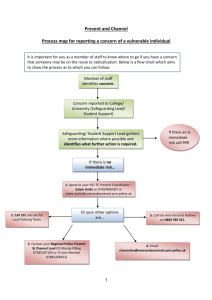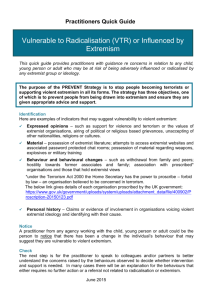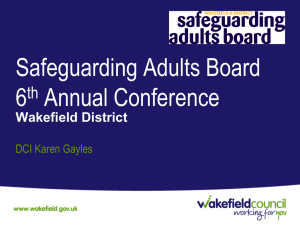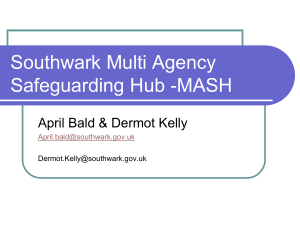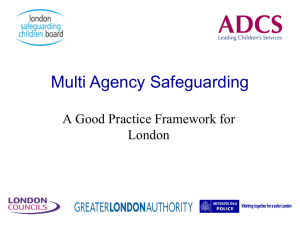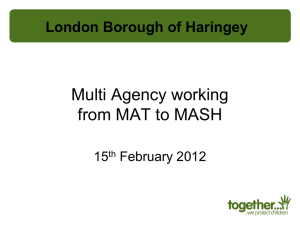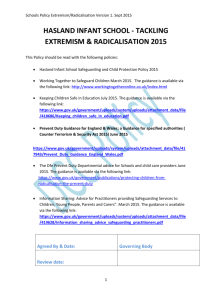VTR Referral Form - Suffolk Safeguarding Children Board
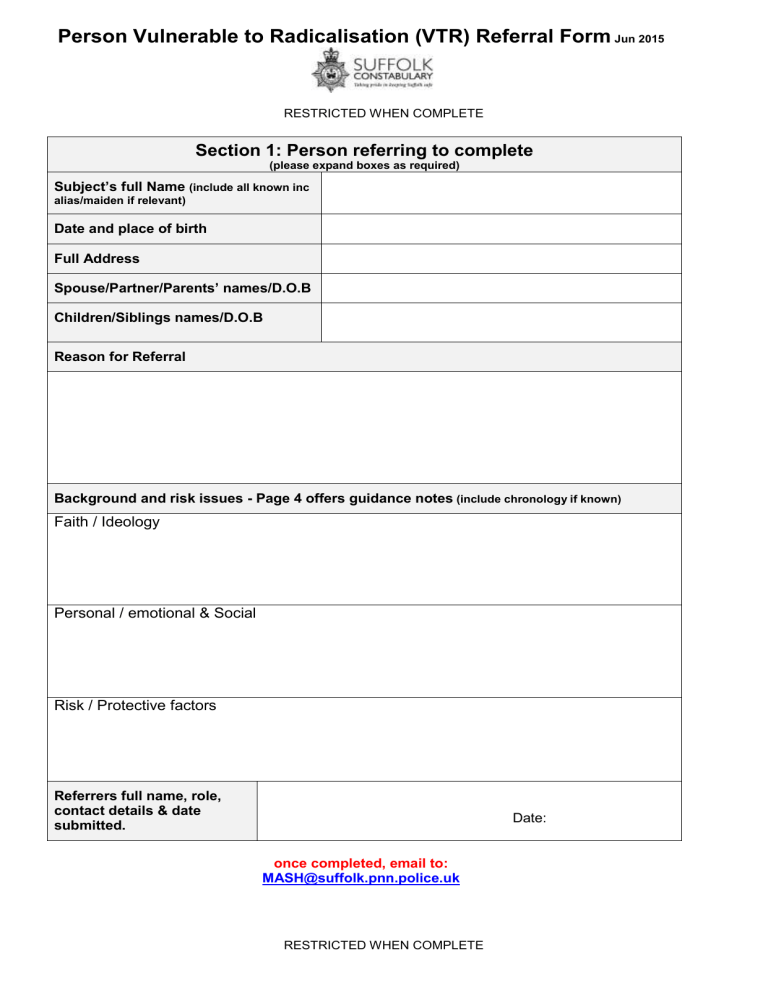
Person Vulnerable to Radicalisation (VTR) Referral Form
Jun 2015
RESTRICTED WHEN COMPLETE
Section 1: Person referring to complete
(please expand boxes as required)
Subject’s full Name
(include all known inc alias/maiden if relevant)
Date and place of birth
Full Address
Spouse/Partner/Parents ’ names/D.O.B
Children/Siblings names/D.O.B
Reason for Referral
Background and risk issues - Page 4 offers guidance notes (include chronology if known)
Faith / Ideology
Personal / emotional & Social
Risk / Protective factors
Referrers full name, role, contact details & date submitted.
Date: once completed, email to:
MASH@suffolk.pnn.police.uk
RESTRICTED WHEN COMPLETE
Person Vulnerable to Radicalisation (VTR) Referral Form
Jun 2015
RESTRICTED WHEN COMPLETE
Section 2: MASH forward to
Suffolk Special Branch by e-mail SpecialBranch@suffolk.pnn.police.uk
Deconfliction checks completed by SB, form then returned to MASH
MASH complete agency checks
This process must only take place after SB deconfliction checks – then return to Special Branch
MASH system checks
(please expand boxes as required)
Police inc. CIS, PNC, PND ☐
Adult Services ☐
Children’s Services ☐
Education ☐
Housing ☐
General Health ☐
Mental Health ☐
Other (please state)
CATS reference generated
Completed by: Date/time:
For MASH only:
Send to Suffolk Special Branch by e-mail SpecialBranch@suffolk.pnn.police.uk
RESTRICTED WHEN COMPLETE
Person Vulnerable to Radicalisation (VTR) Referral Form
Jun 2015
RESTRICTED WHEN COMPLETE
Section 3: Suffolk Special Branch to complete
SPOE to enter on to FIMU sheet then email to
Prevent lead/deputy
SPOE:
Sent to:
Date: Time:
Deconfliction checks by
Prevent lead/deputy
(local/Nat NSBIS, DTU, CMIS)
Conflict ☐ If yes, stop, back to SPOE;
No conflict ☐ If no, proceed to next point;
Prevent assessment by:..................................................
Suitable for CHANNEL support:
YES ☐ If yes, individual needs entering on CMIS at this point.
NO ☐
Reasons
If No, is there an apparent vulnerability to radicalisation to manage outside of
CHANNEL through Prevent
Case Management?
YES ☐
NO ☐
If No, is there another safeguarding issue apparent but no signs of a vulnerability to radicalisation?
YES ☐
Raise this with a MASH supervisor, agree outcome and refer back to MASH by email as necessary.
NO ☐
Decision to close referral made by:
Date/Time
Detail where rationale is recorded:
Referrer notified of outcome By: Date/Time:
RESTRICTED WHEN COMPLETE
Person Vulnerable to Radicalisation (VTR) Referral Form
Jun 2015
RESTRICTED WHEN COMPLETE
GUIDANCE NOTES FOR COMPLETING THIS FORM
This form is to help you refer concerns about an individual who may be vulnerable to being drawn into terrorism. Below are questions which may help you to quantify and structure your concerns. The list is not exhaustive and other factors may be present but they are intended as a guide to help communicate your professional judgement about what has led you to make this referral.
Faith / ideology
Are they new to a particular faith / faith strand?
Do they seem to have naïve or narrow religious or political views?
Have there been sudden changes in their observance, behaviour, interaction or attendance at their place of worship / organised meeting?
Have there been specific examples or is there an undertone of “ Them and Us “ language or violent rhetoric being used or behaviour occurring?
Is there evidence of increasing association with a closed tight knit group of individuals / known recruiters / extremists / restricted events?
Are there particular grievances either personal or global that appear to be unresolved / festering?
Has there been an increase in unusual travel abroad without satisfactory explanation?
Personal / emotional / social issues
Is there conflict with their families regarding religious beliefs / lifestyle choices?
Is there evidence of cultural anxiety and / or isolation linked to insularity / lack of integration?
Is there evidence of increasing isolation from family, friends or groups towards a smaller group of individuals or a known location?
Is there history in petty criminality and / or unusual hedonistic behaviour (alcohol/drug use, casual sexual relationships, and addictive behaviours)?
Have they got / had extremist propaganda materials ( DVD’s, CD’s, leaflets etc.) in their possession?
Do they associate with negative / criminal peers or known groups of concern?
Are there concerns regarding their emotional stability and or mental health?
Is there evidence of participation in survivalist / combat simulation activities, e.g. paint balling?
Risk / Protective Factors
What are the specific factors which are contributing towards making the individual more vulnerable to radicalisation? E.g; mental health, language barriers, cultural anxiety, impressionability, criminality, specific grievance, transitional period in life etc.
Is there any evidence of others targeting or exploiting these vulnerabilities or risks?What factors are already in place or could be developed to firm up support for the individual or help them increase their resilience to negative influences? E.g. positive family ties, employment, mentor / agency input etc.
RESTRICTED WHEN COMPLETE
